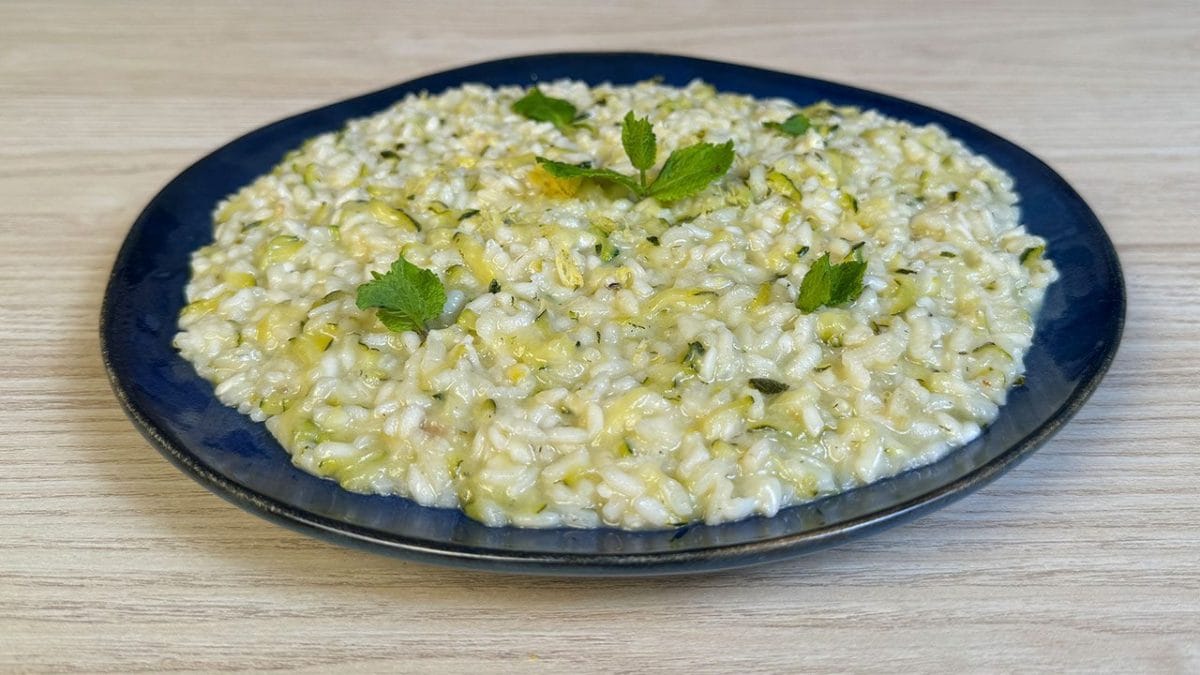
Creamy Zucchini Risotto is a vegetarian main dish ideal for summer, easy to prepare and suitable for adults and children. Made with a few simple ingredients, it is perfect for a family lunch or dinner, but will also make its mark on the occasion of a special occasion with friends.
We're going to show you how to make it to perfection: the rice is toasted with a base of oil and spring onion, blended with white wine, mixed with grated zucchini and then cooked with boiling vegetable broth, poured as it is absorbed. Once ready, it is creamed with parmesan, Asiago cheese in cubes and raw oil.
The end result is a creamy and wavy risotto, to be completed with fresh mint leaves and lemon zest for a fresh and aromatic note.
What is Creamy Zucchini Risotto?
Originating in Northern Italy, risotto became a staple in regions like Lombardy and the Veneto, where rice cultivation thrived due to the fertile plains of the Po Valley. The dish's creamy texture is achieved through a meticulous cooking process that involves gradually adding broth to rice, allowing it to absorb the liquid slowly. Over time, Italians began incorporating local vegetables into risotto, with zucchini becoming a popular choice due to its abundance and mild flavor. The addition of zucchini not only enhanced the dish's nutritional value but also complemented the creamy consistency of risotto, making it a beloved variation across Italy.
Zucchini itself has an intriguing history. While it originated in Mesoamerica, the variety we recognize today was cultivated in Northern Italy in the late 19th century. The term "zucchini" derives from the Italian word "zucchino," meaning small squash. Italian immigrants introduced zucchini to the United States in the early 20th century, with the first records dating back to the 1920s. As Italian communities established themselves in America, they brought with them their rich culinary traditions, including risotto. Over time, zucchini risotto found its place in American kitchens, appreciated for its comforting texture and the subtle flavor of zucchini, especially during the summer months when the vegetable is in season.
Pro Tips for The Best Zucchini Risotto
- Always toast the rice in a bit of oil or butter for 2–3 minutes before adding wine or broth. This locks in the starch and improves texture.
- Warm vegetable or chicken broth should be added one ladle at a time. Wait until it's almost fully absorbed before adding more to allow the rice to cook evenly.
- A splash of dry white wine adds acidity and depth. Add it after toasting the rice, and let it evaporate before proceeding with the broth.
- Stirring helps release the rice’s starch, making the risotto creamy. Don’t over-stir, as this can make it gluey.
- Let the risotto sit covered for 2 minutes after cooking. This allows flavors to meld and the texture to set.
- Risotto is best enjoyed freshly made. Its creamy texture doesn’t hold up well if left standing or reheated.
Do I Need to Pre-Cook the Zucchini for This Risotto?
Yes, it's best to lightly pre-cook the zucchini to enhance flavor and prevent sogginess.
How Do I Avoid Soggy Zucchini in This Risotto?
To prevent soggy zucchini in risotto, slice it evenly into small cubes or not-too-thin slices and sauté it briefly in hot oil for just 3–5 minutes until tender but still firm. Then, add it to the risotto during the final minutes of cooking. This technique ensures the zucchini maintains a pleasant, tender-crisp texture without becoming mushy.
What is The Best Rice to Use?
For a flawless result, choose the most suitable variety of rice, such as Carnaroli or Baldo, which maintain a firm consistency and ensure a super enveloping dish.
Can I Add Anything Else to This Risotto?
If you like, you can replace the Asiago with Fontina, Scamorza or Caciocavallo, and give it a stronger touch with Pecorino instead of Parmesan. To make it even more tasty and decisive, you can add a few cubes of crispy smoked bacon, cooked in a separate pan without adding fat, or some speck matchsticks.
Can I Make This Risotto Vegan?
Yes, you can easily make zucchini risotto vegan by using vegetable broth and omitting butter and Parmesan cheese. For creaminess and flavor, finish the risotto with a drizzle of high-quality olive oil and a sprinkle of nutritional yeast or a vegan Parmesan alternative.
What Can I Serve This Zucchini Risotto With?
Zucchini risotto pairs beautifully with a fresh green salad, roasted vegetables, or grilled mushrooms for a light meal. For a heartier option, serve it alongside baked tofu, seared scallops, or lemony chicken. A crisp white wine like Pinot Grigio also complements the delicate flavors perfectly.
Can I Make it Ahead of Time?
While risotto is best served fresh, you can make it ahead by slightly undercooking it, then cooling and storing it in the fridge. When ready to serve, reheat gently with a splash of broth or water, stirring until creamy and fully cooked. Avoid adding final touches like butter or cheese until reheating.
Does It Freeze Well?
Risotto doesn’t freeze well because the rice can become mushy and lose its creamy texture upon thawing.
How to Store Any Leftovers
Store leftover zucchini risotto in an airtight container in the refrigerator for up to 3 days. To reheat, add a splash of broth or water and warm it gently on the stovetop while stirring until creamy. Avoid microwaving, as it can dry out the texture.
Ingredients
How to Make Creamy Zucchini Risotto
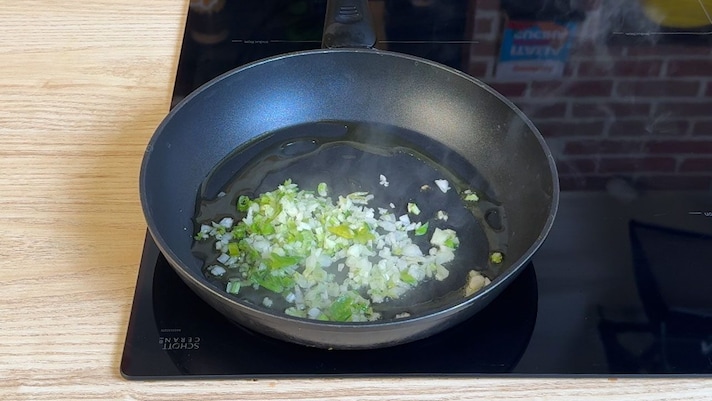
Finely chop the spring onion stalk, then let it fry in a pan with a generous drizzle of oil until it is golden brown.
Finely chop the spring onion stalk, then let it fry in a pan with a generous drizzle of oil until it is golden brown.
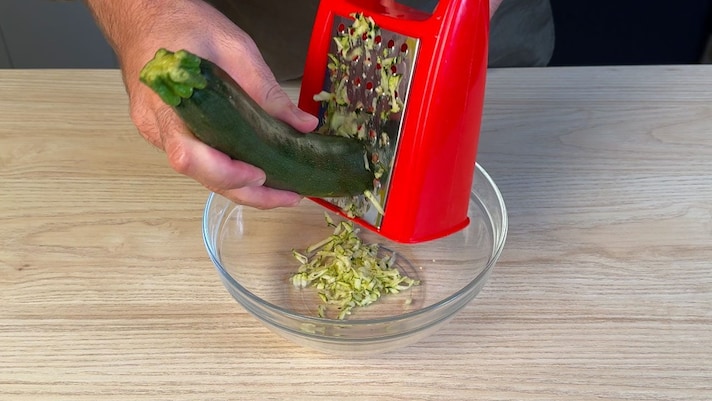
Meanwhile, rinse and grate the zucchini using a grater with large holes.
Meanwhile, rinse and grate the zucchini using a grater with large holes.
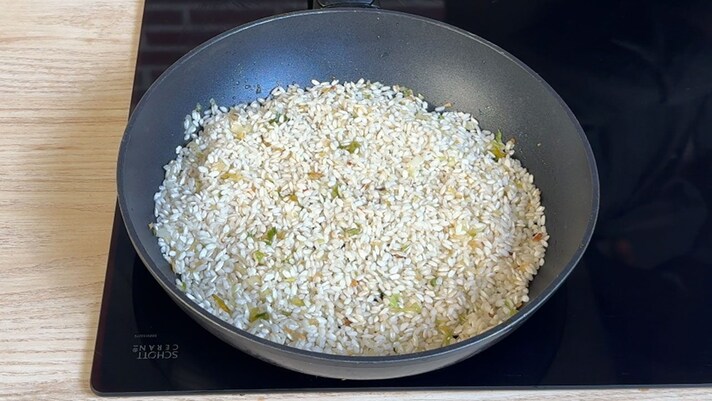
When the spring onion is golden, add the rice and let it toast until the beans are translucent.
When the spring onion is golden, add the rice and let it toast until the beans are translucent.
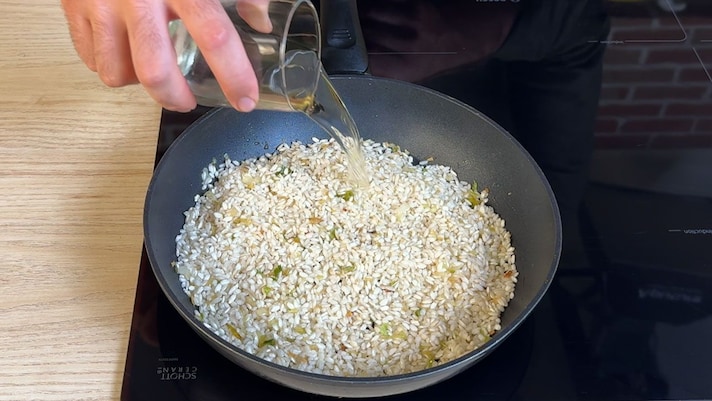
At this point, blend with the dry white wine and let the alcohol evaporate for a few seconds.
At this point, blend with the dry white wine and let the alcohol evaporate for a few seconds.
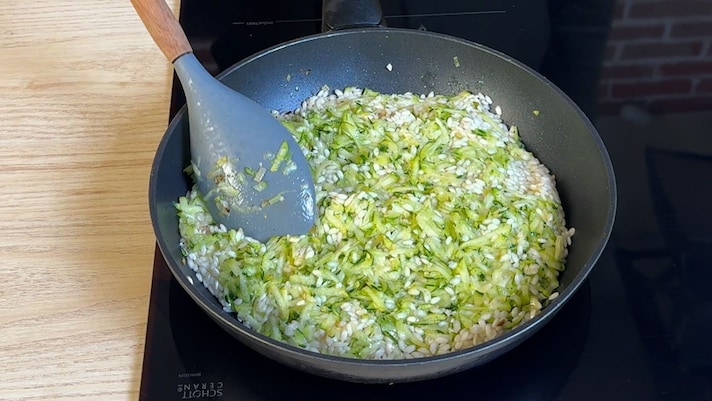
Add the grated zucchini and mix to combine with the rice.
Add the grated zucchini and mix to combine with the rice.
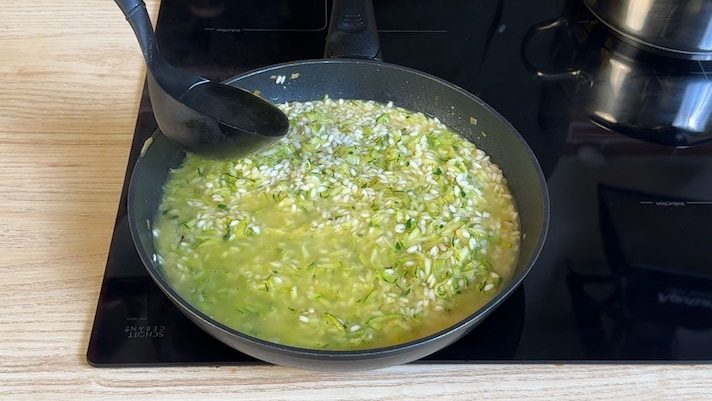
Pour a ladle of vegetable broth and cook the rice, adding more broth as the previous one is absorbed.
Pour a ladle of vegetable broth and cook the rice, adding more broth as the previous one is absorbed.
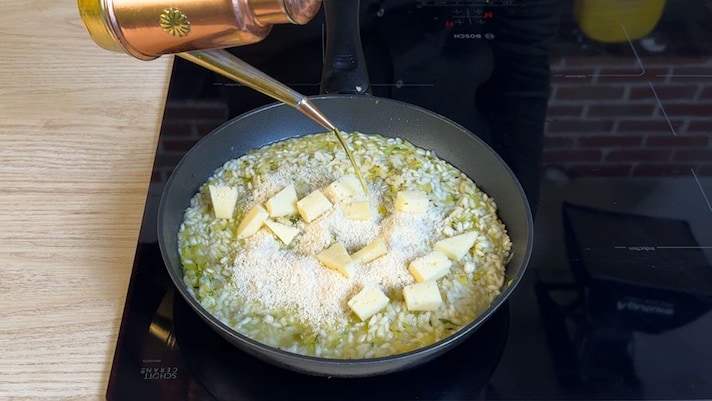
When the risotto is al dente, turn off the heat, season with salt and pepper, add the grated parmesan, the Asiago cheese cut into cubes and a drizzle of oil, then mix thoroughly for a few moments.
When the risotto is al dente, turn off the heat, season with salt and pepper, add the grated parmesan, the Asiago cheese cut into cubes and a drizzle of oil, then mix thoroughly for a few moments.
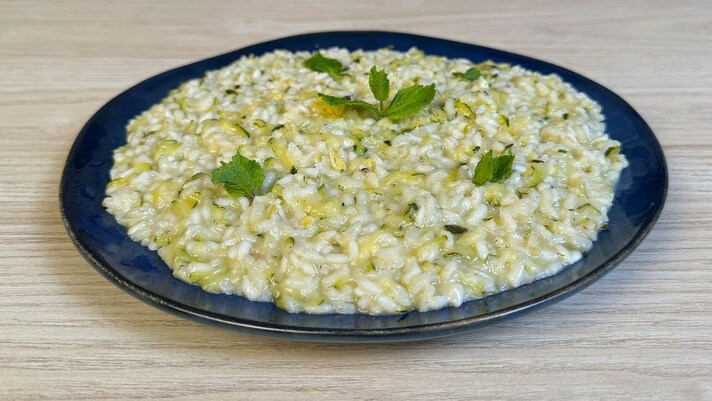
Plate the risotto, garnish it with some fresh mint leaves and a little lemon zest, then bring it to the table. Enjoy!
Plate the risotto, garnish it with some fresh mint leaves and a little lemon zest, then bring it to the table. Enjoy!
;Resize,width=767;)
